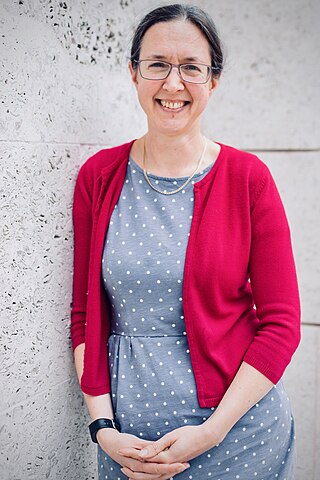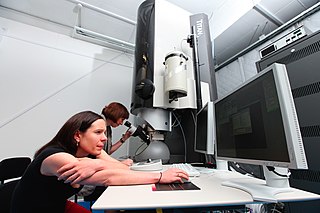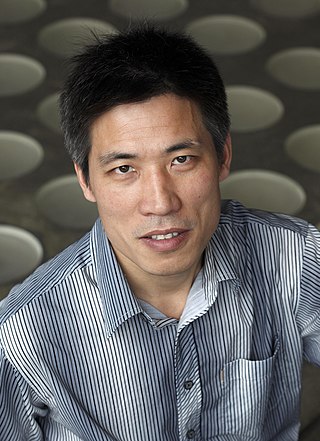
The Institute of Materials, Minerals and Mining (IOM3) is a UK engineering institution whose activities encompass the whole materials cycle, from exploration and extraction, through characterisation, processing, forming, finishing and application, to product recycling and land reuse. It exists to promote and develop all aspects of materials science and engineering, geology, mining and associated technologies, mineral and petroleum engineering and extraction metallurgy, as a leading authority in the worldwide materials and mining community.

Ernest Demetrious Hondros was a British material scientist, and visiting professor at Imperial College London.
The Kavli Medal is the name of two medals awarded biennially by the Royal Society.
Alan G. Thomas (1927-2019) was an international authority on the mechanics of rubbery materials, in particular their fracture mechanics properties. Along with Ronald S. Rivlin, he published the Rupture of Rubber series of articles, beginning in 1953. He was the first to apply Griffith's energy release rate criterion to the analysis of rubber's strength and fatigue behavior.

Dame Molly Morag Stevens, is Professor of Biomedical Materials and regenerative medicine and Research Director for Biomedical Materials Sciences in the Institute of Biomedical Engineering at Imperial College London.

Javier Pérez-Ramírez is a Professor of Catalysis and Chemical Engineering at ETH Zurich.

Paul O'Brien was professor of Inorganic Materials at the University of Manchester. where he served as head of the School of Chemistry from 2004 to 2009 and head of the School of Materials from 2011 to 2015. He died on 16 October 2018 at the age of 64.

Thomas Benjamin Britton is a materials scientist and engineer based at The University of British Columbia. He is a specialist in micromechanics, electron microscopy and crystal plasticity. In 2014 he was awarded the Silver Medal of the Institute of Materials, Minerals and Mining (IOM3), a society of which he then became a Fellow in 2016.
Charlotte Williams is a Professor of Inorganic Chemistry at the University of Oxford. Her research focuses on the synthesis of novel catalysts with an expertise in organometallic chemistry and polymer materials chemistry.
Camille Petit is a Reader in Materials Engineering at Imperial College London. She designs and characterises functional materials for environmental sustainability.

Karen Louise Scrivener is a material chemist known for her pioneering works in cementitious materials. She is the head of Laboratory of Construction Materials at Ecole Polytechnique Fédérale de Lausanne and served as the editor-in-chief of the Cement and Concrete Research journal for 15 years.

Rachel Angharad Oliver is a Professor of Materials Science at the University of Cambridge and a fellow of Robinson College, Cambridge. She works on characterisation techniques for gallium nitride materials for dark-emitting diodes and laser diodes.

Sarah Jane Haigh is a Professor in the School of Materials at the University of Manchester. She investigates nanomaterials using transmission electron microscopy, including two-dimensional materials such as graphene.

Natalie Stingelin, Fellow of the Materials Research Society and Royal Society of Chemistry, is a materials scientist and current chair of the School of Materials Science and Engineering at the Georgia Institute of Technology, the University of Bordeaux and Imperial College. She led the European Commission Marie Curie INFORM network and is Editor-in-Chief of the Journal of Materials Chemistry C and Materials Advances.
Allan Matthews (1952) is professor of surface engineering and tribology at the University of Manchester and director of the Digitalised Surfaces Manufacturing Network.

Junwang Tang, MAE, FRSC and FIMMM, is the Founding Director of Industrial Catalysis Center, and Carbon Neutrality Chair Professor of Materials Chemistry and Catalysis at the Department of Chemical Engineering, Tsinghua University and Visiting Professor at University College London (UCL). He also served as the Director of the University Material Hub at UCL (2016–2019).

Susan Andrea Bernal López is a Colombian materials scientist who is Professor of Structural Materials at the University of Leeds. Her research considers design, development and characterisation of novel cements. She was awarded the 2020 Institute of Materials, Minerals and Mining Rosenhain Medal and Prize.
Professor Andy Long FREng is the Vice-Chancellor and Chief Executive of Northumbria University, the fifth person to hold this role in the institution’s history.
James Busfield is a Queen Mary University of London professor, and head of the United Kingdom's largest research group in the area of Soft Matter.

Sohini Kar-Narayan is a British–Indian materials scientist who is a professor at the University of Cambridge. Her research considers polymer based materials for energy harvesting. She was awarded the 2023 Royal Society of Chemistry Peter Day Prize.













